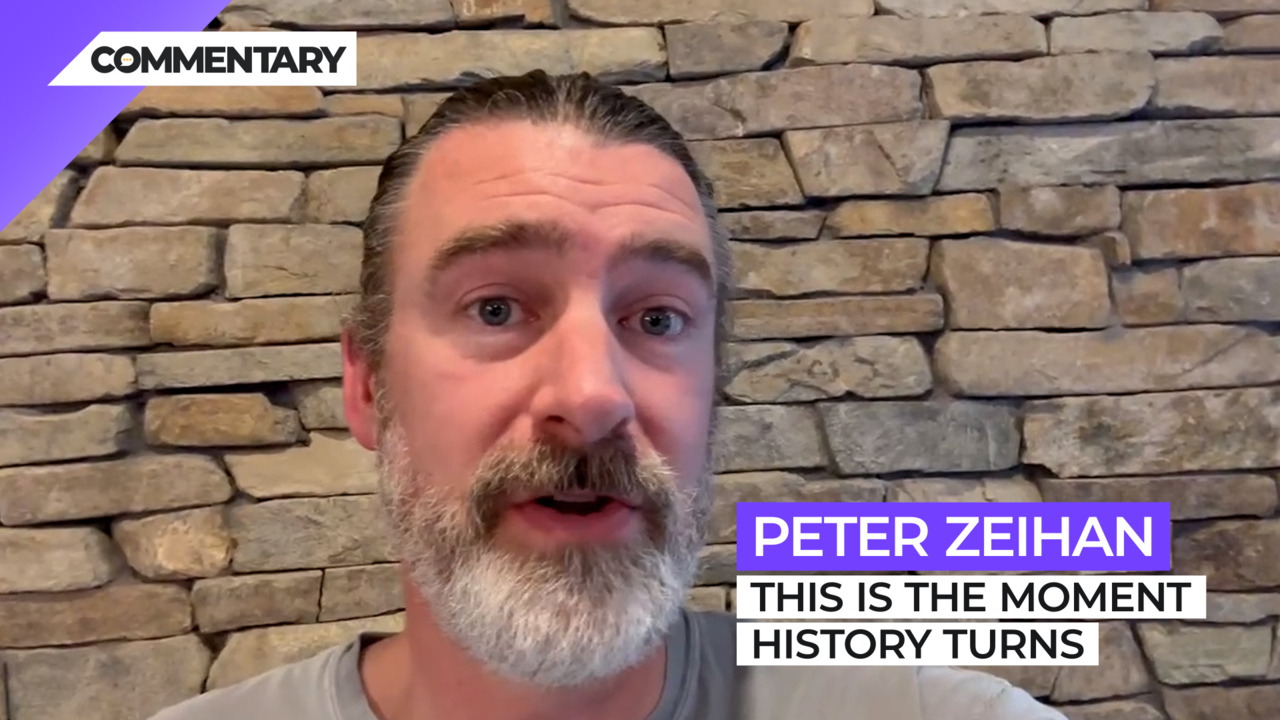
Commentary
-
Our commentary partners will help you reach your own conclusions on complex topics.
Hey everyone, Peter zoning here coming to you from Colorado. I thought today, you know, since we’re nearing the end of the year, it’d be a great time to kind of get our feet under us and understand like the big, big, big issues that are going to be facing us over the next three to 10 years. In fact, a lot of this is probably going to be front loaded. Anyway, more on that later. Now, the story of the world is one of globalization and demography with globalization, everyone was able to buy whatever they wanted from everywhere else, and everyone could start industrializing urbanizing at the same time. Now, when that started in earnest back in 1945, well, the map of the world changed, especially economically because now all of a sudden, colonies were independent, because the Americans forced the Empires to break. And because the war destroyed the Empires back at home. You fast forward that a while and demographic patterns change. It used to be that everybody lives on the farm. Now most of us live in towns. And when we moved from the farm in the town, kids went from being free labor to really expensive habits, so we all had fewer of them. So in the case of the United States, we went from having four to seven kids to now two. Now, it didn’t all happen at the same time. It didn’t all happen at the same pace. But we had a really big divergence in the patterns about 30 years ago, because 30 years ago, the Cold War ended. And that triggered another change from a geopolitical and an economic point of view, parts of the world that had not been included in the globalized system, going back to 1945 Suddenly could so whether it were countries that were in the NonAligned Movement who decided, okay, laissez faire capitalism and international trade of some form is going to be their future and they joined in the party, or because the Cold War ended in the Soviet split was over. So the former Soviet world could come in or some combination thereof. The point is, is that an entire section of the world that had set out the first round of modernization and industrialization and urbanization suddenly joined in, and they joined in at a time where there was already a lot of the world that was fairly advanced. So the markets were huge, the amount of capital that was available was huge. And all of the things that everyone else started in 1945, that these new countries started in 1992. Just happened faster. And if you think of the growth story of the world, and economic development of the world since 1992, it’s been kind of bonkers. Because the Chinese came into this era, Russian energy and resources were dumped into the system in this era as the Soviet system and its industry collapsed. But the raw materials were still there. And Brazil was able to metabolize Chinese manufactured goods, Chinese capital and Russian raw materials in order to become the the economic and agricultural superpower it is today. So the growth of the last 30 years, in many ways, was taking everything that happens and finding 1945 and kind of compressing it. And so they got the post 1992 growth and the post 1945 growth all at the same time. And of course, it has been impressive. But the path that they were on for industrialization, urbanization, and demographic aging, also happened faster. So yes, we saw a lot of growth. But now we’re at the point where a lot of these places around the world, whether they started earlier or later are all converging on mass retirement more or less, at the same time, with the developed world leading the way, the majority of the baby boomers of the world age into mass retirement at the end of this year. So you know, we’re kind of there. It’s not an issue of having too few children. It’s now the issue of having too few taxpaying working age adults. And since this has happened in China, and Brazil, and Russia as well, independent that Ukraine war, we’ve always known, this was kind of the moment where history turns. And we now have to get by with a world with less market and fewer working adults and fewer taxpayers and less capital. And that means less trade, because you can’t have trade without consumption and consumption requires adults. So what we’re going to be seeing over the next few years is an unwinding not necessarily of all of globalization, but certainly everything that’s happened since 1992. These are places where the globalized industrialized world is not as well entrenched, it’s not as well funded, they don’t have the consumption themselves that require connections to the rest of the wider world. And the rest of the wider world now no longer has enough adults to buy their stuff in the first place. And as that starts to break down, the ties that bind are going to snap not because anyone’s really making a conscious choice in many cases. But if you are Brazil, and you are importing your fertilizer from the former Soviet system that’s going away. If you are an African, you import the Chinese goods that allow your middle class to exist from China and the Chinese system is facing threats, and that goes away. And if you are anywhere and you’re dependent upon the food that comes out of the Brazilian system, you have a problem. So just just to name a few. European Aerospace is completely dependent on titanium and aluminum that comes from the Russian space that’s going away. The Middle East largely imports its food from Latin America with Brazil being the single largest contributor. So that’s going away South Asia is getting a lot of capital from the baby boomers on a global scale that’s going away. So a lot of these things that throughout the 1990s 2000s and 2010s that we all thought of is just completely normal. We’re really just a moment in time. And that moment is now passing. And we have to unwind the last 30 years of history in a very short period of time, the only real question is whether it’s closer to three years or 10 years. Now, when I started writing, the end of the world is just the beginning. That’s my fourth book, I was thinking it was gonna be closer to 10, I was thinking that this was going to be an awkward, painful, fast process, but that we were gonna have some time to adjust. But then we got Barack Obama who did nothing for eight years. Then we got Donald Trump for four years that took a sledgehammer to everything. Now we have Biden, who’s actually more destructive to international trade than Donald Trump was. We’ve got COVID, which basically stripped two years away from everybody. And now the Chinese are going through the most erratic and high strung and painful COVID outbreak of any country yet, which is certainly going to cause let’s just say, complications for their manufacturing and capital sectors, all at the same time that Russian raw materials are going away whether you need them to build something to fuel your houses or to fertilize your fields. 2023 is going to be an incredibly busy and from a purely a moral and intellectual point of view, a very enlightening year, because we have never seen this level of disruption even in war time, and certainly never on a global scale before. All right. So with that in your back pocket, Happy New Year, everyone. Take care. I’ll see you next year.
-
Hurricane Helene hits US coast, Appalachia and beyond
Hurricane Helene hit Florida and Georgia overnight between Sept. 26 and 27 as a Category 4 hurricane, and accompanying storms will continue reaching deeper into the continental United States today. Dangerous flash flooding from the hurricane, known as storm surge, was some of the worst flooding that the Tampa Bay area has ever seen, and… -
Israel holds upper hand against Lebanon, Hezbollah and Iran
On Wednesday, Sept. 25, Hezbollah launched a ballistic missile at Tel Aviv in retaliation for Israel’s explosive pager attack that blew up devices across Lebanon. Although Israel’s defense systems intercepted the surface-to-surface missile, the attempted strike on Tel Aviv marked a significant escalation by Hezbollah. Since the siege on Gaza began, shortly after the Oct. 7, 2023,… -
The Sinaloa Cartel civil war
Fears of a civil war within the Sinaloa Cartel are growing as violence between competing factions within the cartel continues. The Mexican Army has dispatched around 600 elite troops to Sinaloa to help quell those fears, in addition to roughly 2,200 regular soldiers and National Guard. Watch the above video as Straight Arrow News contributor… -
New Ukrainian weapons hit Russia where it hurts
Ukrainian drones struck a major Russian ammunition depot, triggering a massive explosion that was captured on camera. According to the Ukrainian military, 2,000 tons of munitions had arrived at the depot before the attack. Over the past two years, Ukraine has significantly increased its domestic drone production, allowing it to scale up attacks on military… -
Weighing social costs vs. economic benefits on immigration
Global human migration is one of the defining elements of our current historical era, according to the United Nations. Migrants face both the incentives to leave — forced out by climate change, crime and corruption, extreme poverty or violence — and incentives for where to go, based on available job opportunities and so on. Migration…
Latest Stories
-
 Getty Images
Getty Images
Potential top seeds still making their case for NCAA tournament committee
-
 Getty Images
Getty Images
DOD identifies $80 million in diversity and climate spending
-
 Getty Images
Getty Images
Severe weather threatens Mardi Gras celebrations in New Orleans
-
 Getty Images
Getty Images
MLB spring training: Mixed bag for National League teams 1 week in
-
 Getty Images
Getty Images
Illegal border crossing apprehensions plunge to 8,300 in February: Report
Popular Opinions
-
In addition to the facts, we believe it’s vital to hear perspectives from all sides of the political spectrum.
Latest Opinions
In addition to the facts, we believe it’s vital to hear perspectives from all sides of the political spectrum. We hope these different voices will help you reach your own conclusions.
The opinions published in this section are solely those of the contributors and do not reflect the views of Straight Arrow News.





















Latest Commentary
We know it is important to hear from a diverse range of observers on the complex topics we face and believe our commentary partners will help you reach your own conclusions.
The commentaries published in this section are solely those of the contributors and do not reflect the views of Straight Arrow News.
Dr. Frank Luntz
Pollster and Political Analyst‘Biased’: What Americans think of ‘mainstream media’
‘Getting rid of them’: Americans discuss Trump and immigration
‘Woke’: Why some Biden 2020 voters backed Trump in 2024